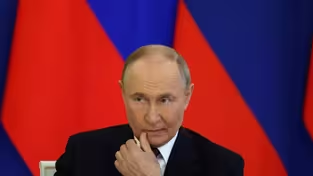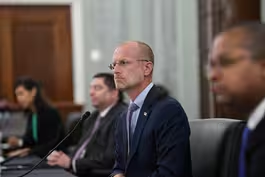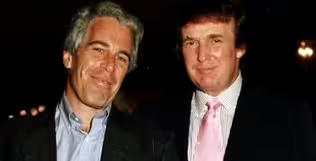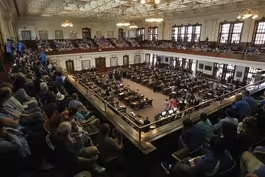
Economist analyzes Trump's tariff policy deadline approaches
Clip: 7/31/2025 | 6m 32sVideo has Closed Captions
Economist analyzes Trump's trade deals as tariff deadline approaches
With hours to go before President Trump’s deadline, dozens of countries are facing the possibility of significant tariffs that could go into effect. But there’s uncertainty around the deadline as Trump announced a 90-day extension for Mexico. Amna Nawaz discussed more with Jason Furman, an economics professor at the Harvard Kennedy School and the former head of the Council of Economic Advisers.
Problems playing video? | Closed Captioning Feedback
Problems playing video? | Closed Captioning Feedback
Major corporate funding for the PBS News Hour is provided by BDO, BNSF, Consumer Cellular, American Cruise Lines, and Raymond James. Funding for the PBS NewsHour Weekend is provided by...

Economist analyzes Trump's tariff policy deadline approaches
Clip: 7/31/2025 | 6m 32sVideo has Closed Captions
With hours to go before President Trump’s deadline, dozens of countries are facing the possibility of significant tariffs that could go into effect. But there’s uncertainty around the deadline as Trump announced a 90-day extension for Mexico. Amna Nawaz discussed more with Jason Furman, an economics professor at the Harvard Kennedy School and the former head of the Council of Economic Advisers.
Problems playing video? | Closed Captioning Feedback
How to Watch PBS News Hour
PBS News Hour is available to stream on pbs.org and the free PBS App, available on iPhone, Apple TV, Android TV, Android smartphones, Amazon Fire TV, Amazon Fire Tablet, Roku, Samsung Smart TV, and Vizio.
Providing Support for PBS.org
Learn Moreabout PBS online sponsorshipGEOFF BENNETT: Welcome to the "News Hour."
With just hours to go before President Trump's own deadline, dozens of countries are facing the possibility of significant new tariffs that could go into effect tomorrow, in some cases as high as 50 percent.
But, once again, there's uncertainty around the deadline and the range of responses from the administration.
Today the president announced a 90-day extension for Mexico in order to reach a broader agreement.
AMNA NAWAZ: At the same time, the president has announced agreements with other allies, including South Korea, which agreed to pay 15 percent tariffs on its exports and invest $350 billion in the U.S.
It would purchase $100 billion more in U.S. energy as well.
In some cases, the president has ramped up threats, including against Canada.
Trump was asked today whether he and Prime Minister Mark Carney could reach a deal.
DONALD TRUMP, President of the United States: He's called.
And we'll see.
But we have made a few deals today that are excellent deals for the country.
You know, we're taking in literally trillions of dollars for the country.
This is making our country very rich and respected again.
AMNA NAWAZ: Joining us now is Jason Furman, economics professor at the Harvard Kennedy School and former head of the Council of Economic Advisers to President Obama.
Jason, welcome back to the "News Hour."
Thanks for joining us.
JASON FURMAN, Former Chair, White House Council of Economic Advisers: Great to be with you.
AMNA NAWAZ: So when we spoke last in April about tariffs and all the uncertainty around them, you said, the question wasn't if inflation and unemployment would go up.
It was how much.
I should point out in your latest op-ed for The New York Times, this is the title.
It's: "The tariffs kicked in, the sky didn't fall.
Were the economists wrong?"
So that's the question I will put to you.
Were you and they wrong?
JASON FURMAN: No.
We have more than a hint of stagflation in the economy right now.
In the first half of the year, the economy grew at a 1.2 percent annual rate.
That's well below the 2 percent we'd like to see.
And inflation, excluding volatile food and energy, was at a 3 percent annual rate.
That's well above the 2 percent we would like to see for that one.
So we're starting to see problems in the economy already.
AMNA NAWAZ: We're starting to see them, but some of the predictions were pretty dire.
You also write in your piece: "Economists, including me, suffer from tariff derangement syndrome.
We find ourselves disproportionately worked up every time they're increased.
Business leaders and financial markets can suffer a touch of this at times too."
Tell me more about that.
Do you feel like the reaction has been disproportionate?
And what's behind that?
JASON FURMAN: Yes, look, I think tariffs are a rather dumb way to raise revenue.
There are so many better ways to get money that do less damage to consumers, less damage to workers and less damage to our international standing.
But they're not the only thing in the world.
They're not necessarily even the worst thing in the world.
And so, when we hear them, we get sort of worked up and probably sometimes make them sound even worse than they are.
But don't get me wrong, they're still not good.
AMNA NAWAZ: In terms of what people are feeling in their everyday lives, though, there was a key inflation measure today that finds core consumer prices rose four-tenths of a percent in June.
That's up 2.8 percent from a year earlier.
Just put that into context for us.
Is that something people are feeling already or will feel soon?
JASON FURMAN: Yes, people experience inflation differently because everyone buys different stuff.
The most salient measure for most people is what the price of gasoline is.
And in the first part of this year, it was going down.
Ironically, that was in part because of the tariffs.
They were weakening the global economy, and that put downward pressure on the price of oil.
Over the last month, you have seen rising gasoline prices in addition to rising prices for lots of other stuff, especially the types of goods that are subject to tariffs, like toys, furniture, computers.
And so I think some of the lull people have felt is starting to come to an end.
AMNA NAWAZ: We are seeing companies handling it very differently, though, right?
We saw Procter & Gamble that make Tide and Pampers, for example, say that they will raise prices on a quarter of all their products next month in part because of the tariffs.
The Wall Street Journal compared Amazon and Walmart prices.
They found Amazon prices rose on 1,200 of their cheapest household goods, while at the same time, Walmart lowered prices on those same items by nearly 2 percent.
Why are we seeing these differences?
JASON FURMAN: Yes, different companies have different strategies, but in the long run, it's really hard to have prices that are completely disconnected from your costs.
And I think you're going to see that especially in the auto industry.
Major auto companies have been reluctant to raise prices.
They don't want to attract the ire of President Trump, who's told them not to raise prices.
But General Motors just posted a big loss.
They can't go on forever selling cars at a loss.
They're not going to do that.
At some point, they are going to raise prices because their costs have gone up.
And otherwise they'd go out of business.
AMNA NAWAZ: So when you take a big picture, look at the strategy here from the White House, it's not 90 deals in 90 days, as they promised.
But the White House and President Trump will argue that they have been making deals.
They have just made a big one in particular with the E.U., which is arguably lopsided in the U.S.' favor.
So is this strategy, including a lot of pledges to buy American products and buy American energy, big picture, is it working?
JASON FURMAN: Look, we're not in the worst of all worlds.
The worst of all worlds would have been a global trade war.
I've actually been surprised that we've gotten all of these deals.
But let's not mistake it.
The tariffs that we have done hurt us.
So whatever other countries did, we were hurting ourselves with these tariffs.
That they have made some of these concessions to open their markets to invest in the United States, that takes away some of the sting.
But it's all much, much smaller than the direct effects of our own tariffs on our own economy.
AMNA NAWAZ: That is Jason Furman, economics professor at the Harvard Kennedy School, joining us again tonight.
Jason, thank you.
Always good to speak with you.
JASON FURMAN: Thank you.
Ex‑CIA analyst slams Trump’s effort to deny Russia probe
Video has Closed Captions
Clip: 7/31/2025 | 11m 45s | Ex-CIA analyst challenges Trump's attempt to discredit Russian election interference probe (11m 45s)
FCC’s Carr says network oversight a needed course correction
Video has Closed Captions
Clip: 7/31/2025 | 9m 40s | FCC chairman says network oversight offers a needed ‘course correction’ (9m 40s)
How Trump's answers about fallout with Epstein have evolved
Video has Closed Captions
Clip: 7/31/2025 | 6m 26s | How Trump's answers about his fallout with Epstein have evolved (6m 26s)
News Wrap: White House sending officials to inspect Gaza aid
Video has Closed Captions
Clip: 7/31/2025 | 4m 56s | News Wrap: White House sending 2 officials to inspect Gaza food distribution (4m 56s)
Shaheen on vote to block Israeli arms: Things need to change
Video has Closed Captions
Clip: 7/31/2025 | 6m 35s | Sen. Shaheen on why more Dems voted to block weapons to Israel: 'Things need to change' (6m 35s)
The Texas redistricting battle and its midterm impact
Video has Closed Captions
Clip: 7/31/2025 | 5m 23s | The Texas redistricting battle and its impact on next year’s midterms (5m 23s)
Providing Support for PBS.org
Learn Moreabout PBS online sponsorshipSupport for PBS provided by:
Major corporate funding for the PBS News Hour is provided by BDO, BNSF, Consumer Cellular, American Cruise Lines, and Raymond James. Funding for the PBS NewsHour Weekend is provided by...

















